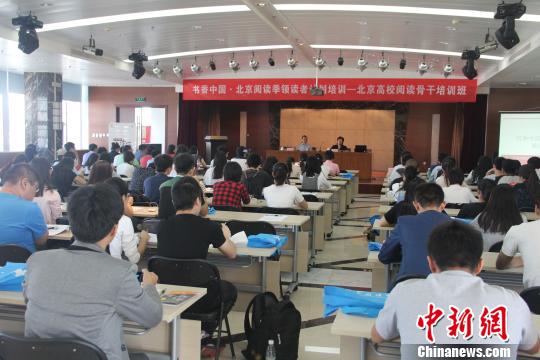
China is facing a reading crisis, with more than 50 percent of people surveyed believing their reading is far from enough, and only 20 percent satisfied with themselves.
According to Xu Shengguo, head of the Chinese Academy of Press and Publication, the country's reading rate last year was 78.6 percent which means that percentage read books, periodicals, newspapers or were involved in online reading. While 21.4 percent read nothing at all.
Xu said the academy launched an annual survey on the reading quantity of Chinese people in 2005, and found that each read 4.5 to 4.7 books on average per year between 2005 and 2014.
Last year Chinese people read only 4.56 books, compared with 12 in France, 11 in South Korea, nine in Japan and about seven in the US. In addition, more than 40 percent of Chinese people read less than one book throughout the year outside of text books.
Sponsored by Beijing Municipal Bureau of Press, Publication, Radio, Film and Television, a training session on reading was held in Beijing on Saturday. It was the first meeting of the "Leading Reader" project, a training series for teachers, officials, college students and bookstore owners on the promotion of nationwide reading. It will be held on weekends during September and October.
Some 150 college students attended the session and heard lectures by Xu, Wang Yijun, director of Department of Public Service in Beijing Municipal Bureau of Press, Publication, Radio, Film and Television, and Lin Dan, originator of Your Bay Parent-child Picture Book Center.
Xu added that in addition to factors such as the large population base in China and imbalance in regional economic development, the shortage of public libraries is widespread. Reading parties in the community are in need of greater promotion.
Wang pointed out that people in Beijing read 9.47 books each year on average other than text books, which ranks first in China. But even such quantity is much lower than Israel where 64 books is normal.
"Chinese scholars and officials have been wringing their hands over the country's declining interest in reading. If we want to promote the nationwide reading rate, we have to encourage more grassroots to read. Not only should we read more books, but also share books with others, to attract more people to join the team of reading," Wang said.
Lin stressed the importance of parents and children reading together, and called on parents to read with their children for 15 minutes every day.
"It is significant for the healthy growth of the younger generation if their parents read with them every day. It also lays the foundation for nationwide reading in future. However, parents should not teach their children what to read or how to read. Instead, they should train their children to gain happiness from reading," Lin said.





